Editor’s Note: Following criticism from White House Press Secretary Karoline Leavitt, hours after this story was published, the BBC issued a statement defending its coverage. It claimed that no story was removed, that fatality figures were updated in line with standard journalistic practice, and that a viral video—initially referenced in its reporting and later debunked by BBC Verify—had no bearing on its coverage.
Over the span of just two days, the BBC, along with several other outlets, reported two alleged massacres of Palestinian civilians at humanitarian aid sites in Gaza. Both stories have spread rapidly and continue to do so. Both are false. And both reflect a deeply broken journalistic process that prioritizes sensationalism over accuracy and gives greater weight to terrorist propaganda than to verified facts.
Let’s start with the facts.
On May 27, the Gaza Humanitarian Foundation (GHF) — a U.S.-backed initiative designed to ensure aid reaches civilians and not Hamas — began operating inside Gaza. On June 2, the GHF reported it had delivered nearly 5.9 million meals via more than 87,000 food boxes at distribution sites in southern and central Gaza. It also announced plans to expand its operations to the north of the Strip.
The first full day of operations was disorderly. Hamas reportedly tried to block access, and large crowds surged the site. Warning shots were fired into the air to regain control. Crucially, no injuries or deaths were reported. Since then, the GHF says aid distribution has proceeded without serious incident.
That’s what we know happened.
Yet this is what the BBC, along with other major outlets, reported to the world:
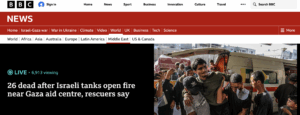
We are focusing on the BBC because its coverage is particularly revealing. This is a broadcaster that claims impartiality and positions itself as a global standard for journalism. But its editorial decisions throughout this war have exposed a consistent pattern of failure. It has shown a willingness to publish unverified claims from sources tied to terrorist groups, with little caution and even less accountability.
A False Massacre Report, Based On Anonymous Sources
On June 1, the BBC issued a breaking update claiming that “Israeli tanks” opened fire on a crowd of Palestinians at an aid site, killing 26. The allegation was presented without confirmation, based solely on anonymous sources: “residents and medics” and a “local Palestinian journalist.” The details, according to the BBC’s own Middle East Editor Sebastian Usher, included bodies carted away by donkey, and “thousands” of civilians gathered near the U.S.-backed aid center in Rafah.
The story appeared as a major headline update to an already misleading and sympathetic headline about Hamas’ ceasefire rejection: “Hamas pledges to free 10 living hostages but seeks permanent ceasefire in response to US plan.”
That headline stayed live for much of the day. The claim of 26 dead later became 31, courtesy of Gaza’s Hamas-run health ministry. And despite a firm denial from the GHF — stating unequivocally that reports of deaths and injuries were “false and fabricated” and warning that the lies were being “actively fomented by Hamas” — the BBC did not retract the story.
![]()
![]()
![]()
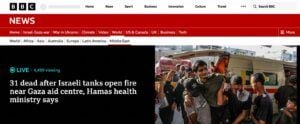
The IDF also issued a statement: it was unaware of any injuries caused by Israeli fire but would review the matter. Instead of treating this with caution, the BBC published yet another update speculating Israeli responsibility — based on operations conducted that same morning in Khan Younis, which the BBC failed to state is around 8 kilometers (5 miles) away from Rafah, where the aid site is located.
![]()
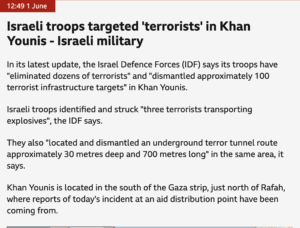
Later that day, after significant pushback and further clarifications from both the IDF and GHF, the BBC finally amended its headline:
![]()
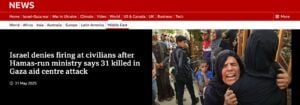
Still, no retraction. No apology.
The Farce of “BBC Verify”
The BBC then assigned its so-called fact-checking unit, BBC Verify, to investigate. The team concluded it could not confirm what had happened, citing “conflicting reports” from the IDF, the Hamas-run health ministry, and the Gaza Humanitarian Foundation.
To be clear, BBC Verify claimed it was unable to determine whether to trust the Israeli military, a U.S.-backed aid organization operating transparently on the ground, or a terrorist group with a documented history of fabricating casualty figures and staging attacks.
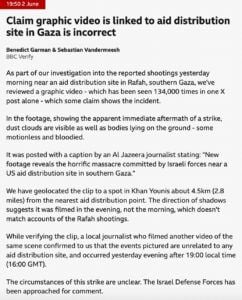
But it gets worse. One of the few pieces of content BBC Verify did manage to debunk was a video allegedly showing the aftermath of the so-called massacre — a video the BBC itself had previously featured in its own reporting.
In effect, the BBC ended up fact-checking its own falsehood, while leaving the original accusation in place.
A Second Blood Libel
Barely 48 hours later, on June 3, the BBC again reported another so-called massacre at the same Rafah aid site:
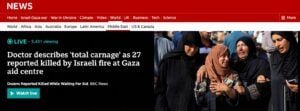
Once again, the IDF stated it was unaware of any incident, aside from one group of suspects approaching troops approximately 500 meters from the site — prompting warning shots. And once again, the GHF confirmed: “Distribution was conducted safely and without incident.”
It added that any incident under investigation occurred well outside the secure distribution area and urged civilians to remain within the designated safe corridor.
Even so, the BBC’s International Editor Jeremy Bowen insisted there were “witnesses who talk about a large amount of shooting going on,” as if this somehow carried equal weight to statements from on-the-ground operators and militaries obliged to follow legal protocols.
Lies That Radicalize
What we are witnessing is not mere negligence. It is something far more serious.
By presenting Hamas propaganda as fact and broadcasting false allegations of Israeli massacres under the banner of breaking news, the BBC is not informing the public. It is fueling confusion and deepening divisions.
These headlines do not simply mislead. They inflame. They contribute to an atmosphere in which Jewish lives are devalued, “Zionists” are openly targeted, and anti-Israel hatred finds violent expression in the real world.
Other major outlets, including CNN, NBC, and The New York Times, have made similarly reckless errors in recent weeks. They, too, bear responsibility. But the BBC, with its global influence and publicly funded mandate to uphold neutrality, has no excuse.
Actually, it’s not a good morning, @nytimes.
Because:
(i) claiming that “Israel said” it opened fire near crowds when that’s not actually what it said, &
(ii) using the Hamas-run Gaza health ministry to buttress your false claim,
is not the news anyone needs to start their day. pic.twitter.com/vxtvVTh1ye— HonestReporting (@HonestReporting) June 3, 2025
According to @Reuters, the sources of this alleged incident are “Palestinian news agency WAFA and Hamas-affiliated media.”
So why is Reuters publishing a headline that treats a disputed incident as fact?#HeadlineFail pic.twitter.com/soLNcvAWVz
— HonestReporting (@HonestReporting) June 1, 2025
What we have documented here is not an isolated lapse. It is a consistent pattern.
Headline after headline. Blood libel after blood libel. A cascade of falsehoods with deadly consequences.
These are not just journalistic failures.
These are the lies that kill.
Liked this article? Follow HonestReporting on Twitter, Facebook, Instagram and TikTok to see even more posts and videos debunking news bias and smears, as well as other content explaining what’s really going on in Israel and the region. Get updates direct to your phone. Join our WhatsApp and Telegram channels!


